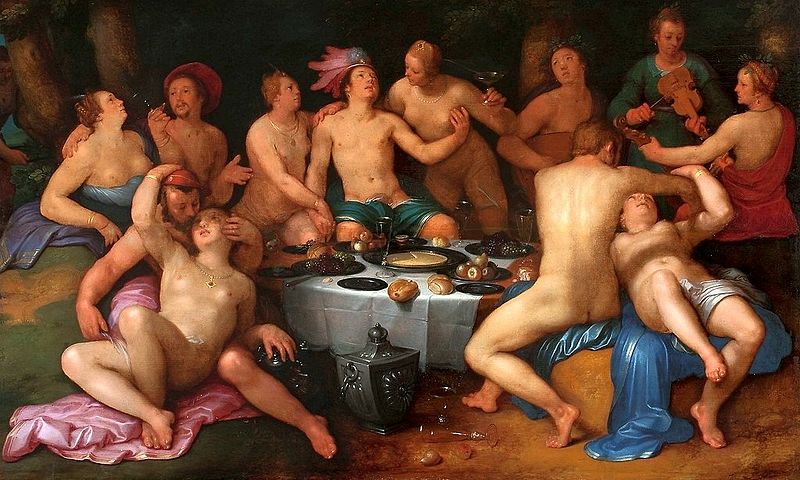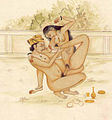Portal:Erotica and pornography
Introduction

Pornography (colloquially known as porn or porno) is sexual subject material such as a picture, video, text, or audio that is intended for sexual arousal. Made for consumption by adults, pornographic depictions have evolved from cave paintings, some forty millennia ago, to modern virtual reality presentations. A general distinction of adults-only sexual content is made-classifying it as pornography or erotica.
The oldest artifacts considered pornographic were discovered in Germany in 2008 and are dated to be at least 35,000 years old. Throughout the history of erotic depictions, various people made attempts to suppress them under obscenity laws, censor, or make them illegal. Such grounds and even the definition of pornography have differed in various historical, cultural, and national contexts. The Indian Sanskrit text Kama Sutra (3rd century CE) contained prose, poetry, and illustrations regarding sexual behavior, and the book was celebrated; while the British English text Fanny Hill (1748), considered "the first original English prose pornography," has been one of the most prosecuted and banned books. In the late 19th century, a film by Thomas Edison that depicted a kiss was denounced as obscene in the United States, whereas Eugène Pirou's 1896 film Bedtime for the Bride was received very favorably in France. Starting from the mid-twentieth century on, societal attitudes towards sexuality became more lenient in the Western world where legal definitions of obscenity were made limited. In 1969, Blue Movie by Andy Warhol became the first film to depict unsimulated sex that received a wide theatrical release in the United States. This was followed by the "Golden Age of Porn" (1969–1984). The introduction of home video and the World Wide Web in the late 20th century led to global growth in the pornography business. Beginning in the 21st century, greater access to the Internet and affordable smartphones made pornography more mainstream. (Full article...)
Erotica is art, literature or photography that deals substantively with subject matter that is erotic, sexually stimulating or sexually arousing. Some critics regard pornography as a type of erotica, but many consider it to be different. Erotic art may use any artistic form to depict erotic content, including painting, sculpture, drama, film or music. Erotic literature and erotic photography have become genres in their own right. Erotica also exists in a number of subgenres including gay, lesbian, women's, monster, tentacle erotica and bondage erotica.
The term erotica is derived from the feminine form of the ancient Greek adjective: ἐρωτικός (erōtikós), from ἔρως (érōs)—words used to indicate lust, and sexual love. (Full article...)
Selected article
Jacobson v. United States, 503 U.S. 540 (1992), is a case decided by the United States Supreme Court regarding the criminal procedure topic of entrapment. A narrowly divided court overturned the conviction of a Nebraska man for receiving child sexual abuse material through the mail, ruling that postal inspectors had implanted a desire to do so through repeated written entreaties.
It was the first time the court had considered an entrapment case from outside the realm of controlled-substance enforcement, or one involving conduct that had only recently been criminalized. By relying exclusively on whether the defendant had a predisposition to commit the crime, the court appeared to have finally resolved a lingering issue in its previous decisions on the subject.
The decision was seen as a rare triumph for defendants before a conservative court that frequently sided with prosecutors. Guidelines for federal law enforcement agents were changed in its wake, and it was described as having brought entrapment "back from the dead." (Full article...)
Selected work of erotic literature
Tropic of Cancer is an autobiographical novel by Henry Miller that is best known as "notorious for its candid sexuality", with the resulting social controversy considered responsible for the "free speech that we now take for granted in literature." It was first published in 1934 by the Obelisk Press in Paris, France, but this edition was banned in the United States. Its publication in 1961 in the United States by Grove Press led to obscenity trials that tested American laws on pornography in the early 1960s. In 1964, the U.S. Supreme Court declared the book non-obscene. It is regarded as an important work of 20th-century literature. (Full article...)
Slideshow of selected contemporary images
Slideshow of selected historical images
Did you know (auto-generated) -

- ... that before being restored as a Broadway theater, the Ritz Theatre was used as a television studio, pornographic theater, vaudeville house, children's theater, and poster warehouse?
- ... that Claudia Riner was falsely accused of distributing lesbian erotica in the Kentucky House of Representatives?
- ... that some viewers of an Arizona TV station saw hardcore pornography instead of the Super Bowl?
- ... that Money Shot: The Pornhub Story was described by multiple reviewers as unsalacious?
- ... that Jan Kochanowski's Fraszki is a 16th-century collection of almost 300 poems, ranging from anecdotes and epitaphs to obscenities and erotica?
- ... that the 1980s were the "age of hole-discovery" in yaoi erotica?
- ... that a pornographic video service once offered NFL quarterback Gardner Minshew a one-million-dollar endorsement deal based on his habit of exercising in nothing but a jockstrap?
- ... that a pornographic screenplay about Jesus led to papal and royal condemnations, a firebombing, the writer's ban from the UK, and thousands of letters per week demanding the ban of a non-existent gay Jesus film?
Topics
Categories
Related portals
Associated WikiProjects
 |
 |
| Sexology and sexuality | Pornography |
Associated Wikimedia
The following Wikimedia Foundation sister projects provide more on this subject:
-
Commons
Free media repository -
Wikibooks
Free textbooks and manuals -
Wikidata
Free knowledge base -
Wikinews
Free-content news -
Wikiquote
Collection of quotations -
Wikisource
Free-content library -
Wikiversity
Free learning tools -
Wiktionary
Dictionary and thesaurus
























































![Image 5Indian Princess, by Richard Borrmeister [de] (1888?)](http://upload.wikimedia.org/wikipedia/commons/thumb/0/01/Richard_Borrmeister_Indische_Prinzessin_1888.jpg/102px-Richard_Borrmeister_Indische_Prinzessin_1888.jpg)















































